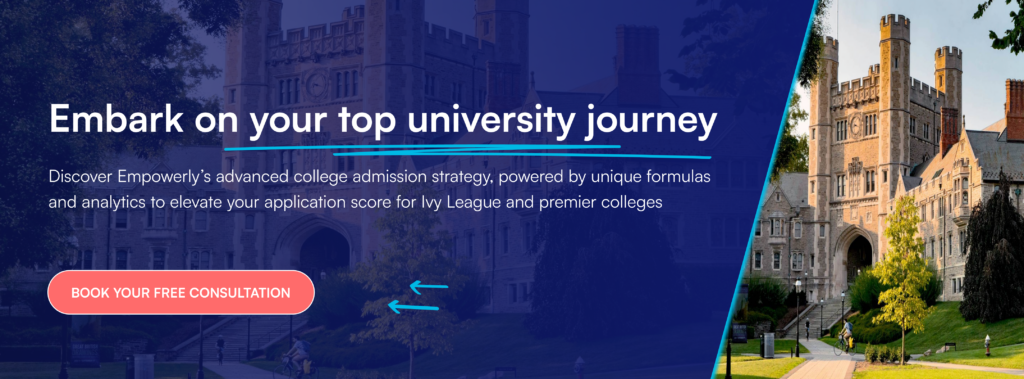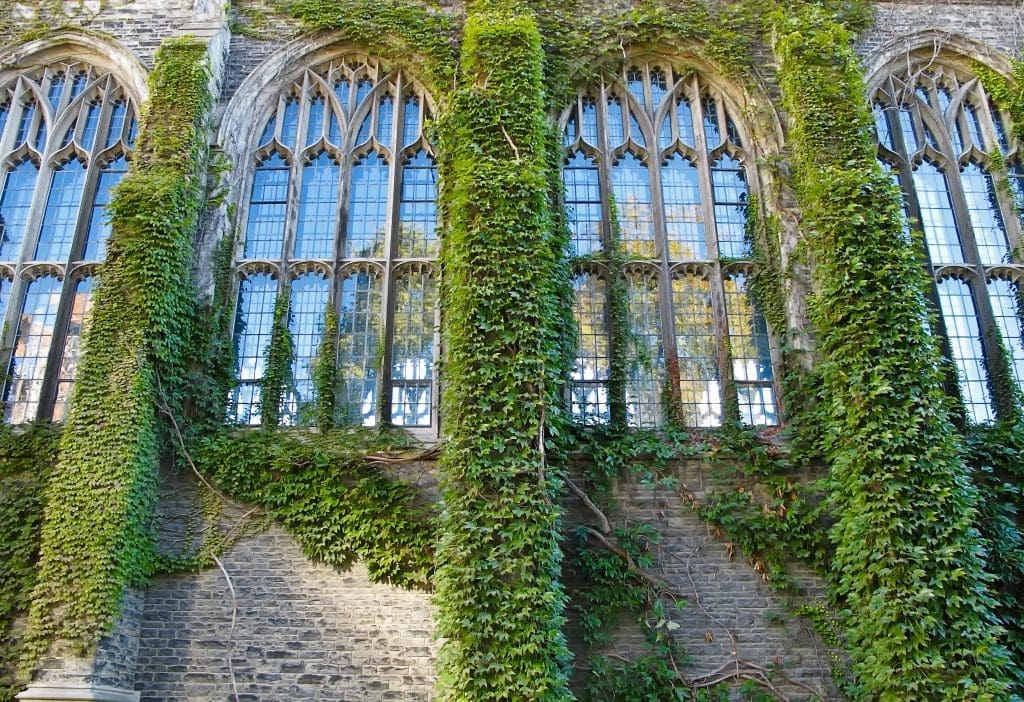When you think of elite higher education, two names often come to mind: Harvard and Yale. Both Harvard and Yale are members of the Ivy League, an elite group of eight private colleges in the United States mutually known for academic rigor, exclusivity, and a strong emphasis on leadership and service.
In particular, these two Ivy League giants are renowned for their academic excellence, storied traditions, and fierce campus rivalry. For prospective college students, the age-old debate between these household names remains alive and well. Ultimately, graduates from both universities become part of influential, far-reaching alumni networks, providing unmatched networking opportunities across industries and continents. But which is right for you?
If you have your heart set on a top college in New England, it’s time to take a look behind the scenes. Let’s dive into the details of the Harvard vs. Yale debate, from a college counseling perspective, to help you make an informed decision about your future.
Why Finding Your Best Fit School Matters
Before diving into comparisons, let’s address the most important part of your college decision: college fit.
Your best-fit school isn’t simply about prestige or rankings; it’s about where your academic goals, career aspirations, and personal preferences align. Harvard and Yale both offer unparalleled opportunities, but your success depends on choosing the environment that nurtures your unique strengths. Which is better for you? Well, there’s no single answer; it all depends on what your student needs to succeed in college and beyond.
At Empowerly, we know how scary these decisions can be. It’s also why we believe every student deserves a personalized approach to this decision. From academic priorities to campus culture, we guide you to uncover the school that will help you thrive.
Next, let’s dive into the key differences that make Harvard and Yale unique to help you make an informed choice.

Harvard and Yale: A Tale of Two Legends in Education
Harvard University
Founded in 1636, Harvard is not only the oldest university in the United States but also a global pioneer in higher education. Initially established to train clergy, the institution quickly evolved into a hub for diverse academic pursuits. The name “Harvard” honors John Harvard, a young clergyman whose generous donation of his library and half his estate laid the foundation for the college.
Over the centuries, Harvard has been at the forefront of major intellectual movements, contributing to advancements in science, politics, and the arts. Notably, it has produced eight U.S. presidents and 161 Nobel laureates, making it a powerhouse of leadership and innovation.
- Mission & Values: Harvard’s mission is centered on expanding knowledge through cutting-edge research and empowering students to become global leaders in various fields.
- Location: Situated in Cambridge, Massachusetts, just across the Charles River from Boston, Harvard offers students access to a bustling metropolitan area teeming with history, culture, and opportunities. Its campus blends historic architecture with state-of-the-art facilities, creating an inspiring academic environment.
- Size: Home to approximately 31,000 students, including undergraduates, graduate students, and professional program enrollees, Harvard maintains a dynamic and diverse community on its sprawling urban campus.
Yale University
Founded in 1701, Yale was originally established as the Collegiate School in Saybrook, Connecticut, to provide clergy training aligned with Puritan values. In 1718, the school was renamed Yale College in honor of Elihu Yale, a benefactor whose support was instrumental in its growth. Over time, Yale expanded its academic scope, becoming a leader in the arts, humanities, and law.
Yale’s influence is perhaps most notable in its dedication to creative and intellectual excellence. Its alumni network extends into government, public service, and the arts, cementing Yale’s legacy as a cultural and intellectual beacon.
- Mission & Values: Yale focuses on cultivating intellectual curiosity and leadership while fostering creativity and social responsibility. Its motto, Lux et Veritas (Light and Truth), reflects its commitment to truth-seeking and enlightenment.
- Location: Located in New Haven, Connecticut, Yale offers a distinctive blend of a small-town atmosphere with a thriving arts and cultural scene. New Haven is home to world-class theaters, galleries, and restaurants, creating a vibrant backdrop for academic life.
- Size: With around 13,500 students, including undergraduates, graduates, and professional students, Yale’s smaller size fosters a close-knit community and an intimate campus environment.
Compare and Contrast
Prestige and Ranking
Harvard and Yale are synonymous with excellence, consistently ranked among the top five universities worldwide. Harvard often ranks slightly higher in global metrics, especially for research output, thanks to its extensive funding and facilities. On the other hand, Yale excels in undergraduate satisfaction and is frequently lauded for its focus on teaching and fostering close student-faculty relationships.
Both institutions boast faculty who are Nobel laureates, Pulitzer Prize winners, and leaders in their fields, ensuring an unparalleled academic experience.
Acceptance Rate
Both schools are among the most selective in the world, admitting only a small percentage of applicants who demonstrate exceptional academic achievements and extracurricular distinction.
- Harvard: approximately 3% acceptance rate, reflecting its rigorous standards and vast applicant pool.
- Yale: approximately 4% acceptance rate, maintaining its status as one of the most exclusive universities.
These figures underscore the fierce competition and the importance of crafting a standout application.
Cost of Attendance
While both schools have high tuition costs due to their private status, they also offer some of the most generous financial aid packages in the world.
- Harvard: Estimated annual cost of $79,450. Over 55% of students receive financial aid, with many paying significantly less based on their family’s income.
- Yale: Estimated annual cost of $80,700. Approximately 51% of undergraduates receive need-based aid, with Yale committing to meet 100% of demonstrated financial needs without loans.
Both institutions aim to make education accessible to talented students, regardless of financial background, with policies ensuring families earning under $75,000 often pay nothing.
Academic Programs
Harvard and Yale share a dedication to interdisciplinary education and leadership development but excel in distinct areas.
- Harvard: Renowned for its programs in STEM, social sciences, and professional schools such as the Harvard Business School, Harvard Law School, and Harvard Medical School.
- Yale: Known for its focus on the arts, humanities, and law. Unique resources include the Yale School of Drama and the Beinecke Rare Book Library, which enrich the cultural and intellectual experience.
Both schools follow a liberal arts curriculum, encouraging students to engage in a wide range of disciplines and critical thinking. State-of-the-art libraries, research facilities, and cultural centers further enhance academic opportunities.
Sports and Spirit
The Harvard-Yale rivalry, often referred to as The Game, is one of the most iconic college rivalries in the U.S. This annual football matchup, dating back to 1875, attracts thousands of fans and alumni from around the world.
- Harvard: Its athletic traditions are bolstered by a range of Division I teams and facilities like the Harvard Stadium.
- Yale: Proud of its storied crew teams, Yale is also home to the Yale Bowl, one of the oldest college football stadiums.
The rivalry extends beyond sports to include debate, music competitions, and other academic and extracurricular contests, fostering a spirited campus culture.
Student Life and Culture
Both institutions emphasize fostering close-knit communities within their campuses, in unique ways.
- Harvard: Its house system creates smaller living and learning communities, promoting interactions among students and faculty. The vibrant location near Boston adds to its dynamic cultural opportunities.
- Yale: Its collegiate system is modeled after the residential colleges of Oxford and Cambridge, offering students smaller, supportive communities with unique traditions.
While both schools prioritize student support, the scope of services varies. Harvard’s expansive resources include specialized advising centers, like the Office of Career Services. Yale’s smaller community allows for personalized support, with residential colleges often doubling as close support networks. The bottom line? Investigate how these services align with your needs.
Student Outcomes
Graduates of both universities are leaders in their fields, benefiting from the extensive alumni networks and the prestige of their degrees.
- Harvard: Known for producing influential figures in business, tech, and government, such as numerous U.S. presidents and global CEOs.
- Yale: Excel in fields like law, public service, and the arts, with alumni including Supreme Court justices, actors, and renowned authors.
Both schools boast high median salaries for graduates and strong placement rates into top graduate programs and industries, underscoring the value of their education.

Insider’s Perspective: Choosing the Right School for You
Academic Priorities
Consideration is key. Both universities also offer unique academic opportunities that could set them apart depending on your goals. Harvard’s cross-registration with MIT allows students to take courses at one of the world’s leading technical institutions, enhancing STEM and innovation pathways. Meanwhile, Yale’s Directed Studies program offers an immersive humanities curriculum for those passionate about philosophy, literature, and political theory.
If you’re leaning toward STEM or international business, Harvard’s global research initiatives may appeal to you. Yale’s resources might feel more aligned if your interests are in the arts, law, or social sciences.
Cost and Financial Aid
Both schools emphasize accessibility, but your financial aid package could differ slightly. Carefully review each offer and use tools like net price calculators to estimate your costs.
Beyond tuition, consider living costs and local opportunities. Cambridge, Massachusetts, offers proximity to Boston’s vibrant job market, internships, and cultural hubs, but living expenses can be higher. New Haven, Connecticut, provides a more affordable cost of living, with a strong focus on arts and community engagement. These factors can significantly influence your day-to-day life and opportunities beyond the classroom.
Campus Culture
Consider whether you prefer the urban energy of Cambridge or the quieter, arts-focused atmosphere of New Haven. Visit both campuses if possible to experience their unique vibes.
How Do You Thrive?
Think about class sizes, extracurriculars, and mentorship opportunities. Harvard’s size may offer more networking reach, while Yale’s intimate environment may provide closer faculty relationships.
Final Tip: Visit Both Campuses
Visiting both schools, either in person or virtually, is one of the best ways to gauge how you feel about each environment. Pay attention to how you connect with the campus, faculty, and students.
If visiting in person isn’t feasible, take advantage of virtual tours and student panels offered by both universities. Engage with current students or alumni through forums or social media to gain a firsthand perspective on campus culture. Observing the types of questions asked in Q&A sessions can also provide insight into what matters most to each school’s community.
Ultimately, both Harvard and Yale are exceptional schools. The decision ultimately comes down to which aligns most closely with your values, academic goals, and vision for the future.
Which School Is the Best Fit for You?
When it comes to Harvard vs. Yale, there’s no universal “right” choice—only what’s right for you. Both schools offer unparalleled education, but your decision should hinge on where you’ll thrive academically, socially, and personally.
Ready to make the best choice? Connect with Empowerly’s expert counselors today to map out your college journey and discover the best-fit school for you!


